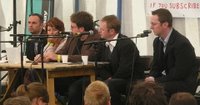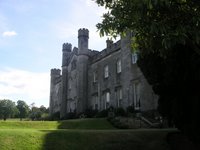 This looked like an explosive lineup, if you'll pardon the expression. Extreme unionist Ian Paisley's DUP and the IRA's political wing, Sinn Fein, together at last!
This looked like an explosive lineup, if you'll pardon the expression. Extreme unionist Ian Paisley's DUP and the IRA's political wing, Sinn Fein, together at last!
Jeffrey Donaldson of the DUP and Sinn Fein's Philip McGuigan were to be together on the same platform. There were also peace workers, one from the Corrymela community, and one who had lost his wife in a bombing, to give a bit of perspective. It was a panel discussion in one of the large tents at Greenbelt 2006, chaired by Gareth Higgins of Zero28.
As it turned out, Jeffrey Donaldson wasn't able to make it (last minute hitch, or political cold feet, I don't know - I missed the excuses at the start). His place was filled by Alex Easton[1], one of his newer colleagues.
It was encouraging in a way - at least the politicians were in the same place, taking part in a discussion. And they had a chance to listen to each other - and maybe even to speak, afterwards, away from the glare of publicity, as human beings.
It was also encouraging to hear the account of Alan McBride, who lost his wife in an IRA bombing, but is now working for peace.
But it was also depressing.
Depressing because the politicians seemed to stay very much on-message -- Tony Blair's spindoctors would have been proud -- and certainly the party whips will have had little cause for concern. Philip McGuigan in particular lost few opportunities to end a discussion with yet another grievance or accusation, with no chance for his opponent to respond. Playing the game, perhaps, but it sat uncomfortably with his claims to be looking for a way forward, wanting to deal with an unwilling DUP.
One two-part question summed up this approach for me. Alex Easton was asked why they referred to "Roman Catholics" when members of that community never used that description - and he agreed (perhaps naively) that it might be better if people referred to each other simply as Christians. Philip McGuigan was asked why they had started to refer to "unionist paramilitaries" when unionists, as opposed to loyalists, defined themselves as against terrorism. "Answer as a human being" pleaded the chairman. The SF representative responded frankly, calling it a "useful phrase" which put across the message that, in his view, the state, unionists, and loyalists were all part of a movement that had been ranged against those who wanted a United Ireland - and finished with accusations of collusion in past killings.
The other depressing answer was on what the DUP really wanted, before they would agree to form a government. Sinn Fein framed the issue as an increasing set of demands from unionists, where, as soon as republicans addressed one issue, another objection came to the fore[2]. The Chairman asked Alex whether, if Sinn Fein did agree to support law and order and join the police, that would be enough for the DUP. The answer was a discouragingly long yet strangely unspecific list of problems and concerns that needed to be addressed.
I can understand concerns about criminality and the like - but I didn't get the feeling of a party that badly wanted to move forward.
It's going to be a long run up to the 25th November deadline for agreement. But at least there is some dialogue - even if the two politicians were talking at each other rather than to each other.
And it will have done them no harm to hear the voices of three people working for peace, and the concerns of a large audience with a limited patience for traditional politicians' preoccupations.
Faint, glimmering signs of hope, in my more optimistic moments.
----
[1] Thanks to the reader who pointed out I had wrongly identified the North Down DUP representative.
[2] That's not how it looks to me, as an observer of the developing peace process, but that's a whole other article.



































